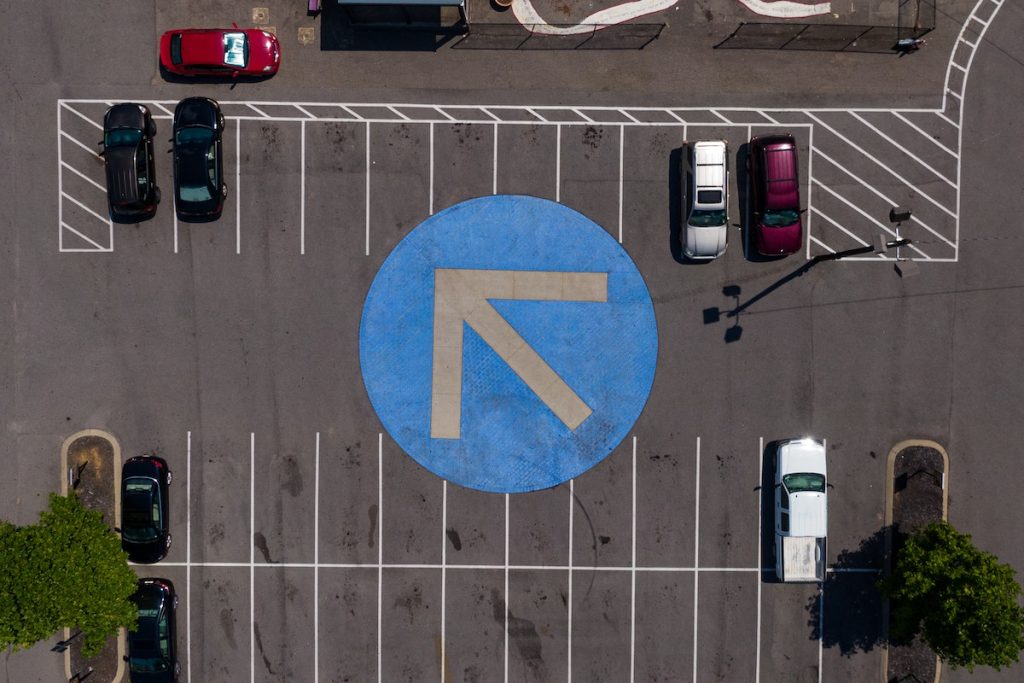If you’re a resident of a residential street, you can park there without any issues. However, if you’re not a resident, the amount of time you’re allowed to park may vary depending on your state.
Generally, the maximum time allowed is 72 hours in most jurisdictions. It’s important to note that specific laws on the matter vary by state, so it is recommended to research the regulations in your local area.
Parking regulations are essential to ensure the safety and convenience of residents living on residential streets. Properly enforced parking restrictions can help prevent traffic congestion, reduce noise pollution, and improve all residents’ overall quality of life.
Car Parking On A Residential Street
Cars spend most of their time parked rather than being driven. When parked, they need a certain amount of space for storage and easy access, but it can be challenging to find enough space.
Distinct Features
Compared to non-residential areas, car parking on a residential street has certain distinct features. It requires providing enough parking spaces and identifying suitable locations to park vehicles.
New residential areas are developed at a lower density, allowing for adequate street space.
The situation differs from non-residential areas and some older residential areas in the city center, where high-density development results in insufficient curb space and the need for off-street parking. However, it is important to note that off-street parking requirements only apply to new residential developments.
Off-street parking requirements are not solely based on curb space or street width. They are also influenced by a desire for community appearance and the goal of keeping cars out of view to maintain an attractive environment.
In residential areas, the amount of necessary parking spots is determined by the number of cars owned by the residents. On the other hand, in non-residential areas, parking spaces are provided for every vehicle utilized by customers, employees, or visitors. The utilization of cars is not as significant in residential areas.
A significant difference is that the availability of mass transit in a residential area doesn’t necessarily affect the need for parking. Even if someone uses mass transit for work, they may still have a car for other purposes. This means that the average number of vehicles per family could be similar in an area with mass transit compared to an area without it.
Limited to 72 Hours
If there are regulations against parking on a residential street, a car may be allowed to be parked for up to 72 hours or even up to one week in some areas. The specific rules on long-term car parking on a residential street vary from state to state.
Parking for extended periods in residential areas is usually not allowed in most states to prevent overcrowding and make it difficult for strangers to park unnoticed. Additionally, some people may park their vehicles in a way that blocks others from leaving. Nonetheless, registered residents of a particular area are exempted from this rule and can park their cars for any duration.
Traffic
Street parking is highly desirable in many downtown areas due to its convenience and limited availability. According to the analysis of 22 studies conducted in 15 different cities between 1927 and 2015, the latest studies from 2005 to 2015 found that approximately 40 percent of traffic was cruising for parking in three cities on average.
Recent studies indicate that the percentage of vehicles searching for parking is 15 percent in Stuttgart, Germany, while in San Francisco, CA, it is five to six percent, and in Ann Arbor, MI, it is three to four percent.
Getting caught in traffic has a considerable effect on your gas money unless you’re the owner of one or more Tesla cars. Moreover, it leads to additional air pollution due to the prolonged idling period.
Street Parking Safety
Studies have found that street parking has an impact on road safety. One review conducted in the U.S. suggested that it was a factor in around 15 percent of crashes. Another report from 1971 found that street parking was responsible, directly or indirectly, for approximately 20 percent of all urban crashes in the U.S.
According to the report, there are five main reasons why street parking can increase the risk of crashes. These reasons include more obstacles on the road (due to parked vehicles), disruptions in traffic flow caused by cars leaving or entering parking spaces, drivers or passengers getting out of parked vehicles, and reduced visibility of pedestrians.
Laws For Car Parking On A Residential Street
The laws and regulations surrounding car parking on a residential street are of utmost importance to ensure the safety and convenience of everyone living there. They help reduce traffic congestion, noise pollution, and other nuisances, and they also help keep the area attractive and aesthetically pleasing.

New York City Parking Regulation
All of New York City is designated as a Tow Away Zone. The designation means vehicles without proper registration or inspection stickers parked or operated illegally may be towed. Parking, stopping, and standing are allowed on major legal holidays except in areas where the rules are enforced seven days a week.
Seattle Parking Regulation
The City of Seattle is enforcing parking regulations for vehicles parked in the same spot for more than 72 hours. Parking enforcement officers will issue a warning notice to the owner or occupants if a vehicle has been parked in one spot for more than 72 hours, allowing them to move the vehicle before any enforcement action is taken.
Houston Parking Regulation
According to City Ordinance 26-93 of Houston, parking a vehicle on a public street for more than 24 hours is not allowed. The purpose of this rule is to prevent the neighborhood from looking unclean and help identify any stolen vehicles.

San Francisco Parking Regulation
In California, there is a 72-hour parking rule for public streets. The rule means you cannot park your car in the same spot for more than 72 hours. Violating this rule can result in a warning, citation, or even having your vehicle towed, even if you have a residential parking permit. The rule is in place to prevent abandoned vehicles from taking up parking spaces. To avoid getting in trouble, move your car to a different spot before the 72 hours are up. Keep in mind that having a disabled placard or residential parking permit does not exempt you from this rule.
San Diego Parking Regulation
You must move a vehicle (working or not) parked on a public street in San Diego after 72 hours. Additionally, it is against the law to leave abandoned, inoperable, wrecked, or dismantled vehicles on private property where the public can see them.
Boston Parking Regulation
If a vehicle is left on city streets for over 72 hours, the City of Boston may take possession of it. The action is only enforced if there is a complaint from a resident or if the vehicle is a safety hazard. A car parked on the same street for over 72 hours is not automatically considered abandoned. Vehicles that are considered abandoned will be tagged with a green sticker. If your car has a green sticker, you must promptly remove it from the public street and make necessary repairs.
Pros and Cons Of Car Parking On Residential Streets
Car parking on residential streets provides convenience and accessibility, but at the same time, it can lead to traffic congestion, safety hazards, and noise pollution. So, if you’re looking for a safe parking space for your Kia hybrid cars, you must consider the pros and cons of parking on a residential street. Here are the pros of car parking on a residential street:
Better Aire Quality
Parking cars in residential areas can improve air quality because it reduces the amount of exhaust gas released into the air by reducing the number of vehicles driving through the area looking for parking spaces.
Lower Car Abandonment Rate
The rate of abandoned cars decreases because drivers and car owners know that their vehicles might be towed if parked for too long in residential areas. People will understand this since it’s a residential area.
Lower Towing Risk
In areas where residents have permits to park on the street, the number of towed cars is reduced because people know the consequences of parking beyond the allowed time. Therefore, they ensure not to leave their vehicles parked longer than the allotted time to avoid getting towed.
Lower Risk of Hitting Pedestrians
If cars are parked in residential areas, they can provide a shield that reduces the risk of pedestrians getting hit by cars.
Convenience
Parking in a residential neighborhood is often more convenient than parking in the city center. The available spaces are usually higher, and residential streets are typically less congested.
Security and Accountability of Residents to One Another
Residents will become more accountable and security-conscious towards each other because they will eventually become familiar with the cars regularly parked in the area, making identifying any unfamiliar or suspicious vehicles easier.
Here are the cons of car parking on a residential street:
Improper Parking Leading to Blocked Driveways or Vehicles
When drivers hastily park their cars and leave without proper parking, it can block someone’s driveway or another resident’s vehicle. In such cases, the car can be reported and may receive a ticket or even be towed.
Challenges in Identifying Unfamiliar Vehicles
It can be difficult to identify suspicious vehicles parked on residential streets. As it is common for people to park their cars on the street for extended periods, anyone can leave their vehicle there without arousing suspicion or being questioned.

Pedestrian Movement Restricted by Blocked Sidewalks
In cases where cars are parked partially on the pavement, the sidewalks become blocked, and pedestrians are restricted from walking through when there is heavy foot traffic.
Higher Car Theft Rate
An increase in car thefts will be noted, particularly in residential areas. The high number of parked vehicles and people in the area makes it easier for burglars to take advantage and steal cars without being caught. As a result, many car owners are reporting break-ins and missing vehicles.
Higher Car Damage Rate
As more cars park on residential streets, there will be a rise in car damage caused by people accidentally hitting other cars while trying to park. This can result in disputes, physical altercations, unexpected expenses to repair the damage, and other related issues.
Increased Traffic Congestion
The limited space available in residential streets is a major disadvantage when it comes to car parking. This can lead to traffic congestion, as residents are forced to look for spots further away from home, and cars must be parked too close together. Additionally, it can be difficult for visitors or delivery vehicles to find a place to park, disrupting the neighborhood.
How Long Can A Car Be Parked On A Residential Street?
You can usually park your car on a residential street for up to 72 hours. Different cities have different rules, so check the law in your area. You won’t be able to park in some places if your car has not been registered or inspected properly. You shouldn’t leave it parked in the same spot for too long, or it could get towed away.
If you have a residential permit or disabled placard, this won’t exempt you from the time limit, so make sure to move your car before the 72-hour mark. In some places, like New York City and Seattle, parking enforcement officers may issue warning notices if they find a vehicle parked in one spot for more than 72 hours.
Also, make sure not to block anyone’s driveway or leave your car in a hazardous spot, which can also lead to penalties.
Therefore, when parking on a residential street, it is crucial to be mindful of the laws and regulations that are in place. This will help keep the area safe and convenient for everyone involved.
Parking a car on a residential street comes with certain advantages and disadvantages. It can provide convenience, better air quality, increased accountability among residents, and reduced towing risk; however, it may also lead to traffic congestion, higher car theft rates, improper parking leading to blocked driveways or vehicles, and pedestrian movement restricted by blocked sidewalks.
Knowing the laws in your area is essential for safe and legal parking on residential streets. Generally speaking, you should only park your car in one spot for up to 72 hours without moving it at least 1/10th of a mile from its original location. If you follow these rules properly, you can enjoy all the benefits of car parking on a residential street while avoiding any potential problems or penalties.





